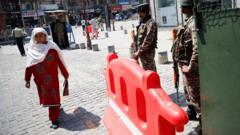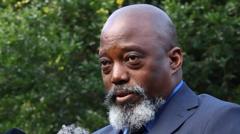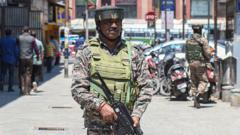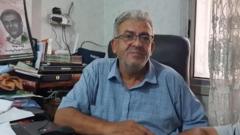The commutation of sentences for Marcel Malanga, Tyler Thompson, and Benjamin Zalman-Polun marks a significant development ahead of a U.S. diplomatic visit, with implications for U.S.-DR Congo relations amid ongoing legal uncertainties.
U.S. Death Sentences Commuted in Congo Coup Case

U.S. Death Sentences Commuted in Congo Coup Case
Three American nationals have had their death sentences commuted to life imprisonment in connection with a failed coup attempt in the Democratic Republic of Congo.
Three American citizens convicted in connection with a failed coup attempt in the Democratic Republic of Congo (DRC) have had their death sentences reduced to life imprisonment, as announced by the country's presidency. Last September, these individuals were part of a larger group of 37 people sentenced to death by a military court for their alleged involvement in a May 2022 attack on the presidential palace and the residence of a presidential ally.
This commutation arrives as the new U.S. senior advisor for Africa, Massad Boulos, prepares to visit the DRC, signaling potential diplomatic ramifications. The U.S. government has not formally classified the Americans as wrongfully detained; however, the State Department has indicated ongoing discussions regarding their conditions.
The three men—Marcel Malanga Malu, Tyler Thompson, and Benjamin Zalman-Polun—were found guilty of charges including criminal conspiracy and terrorism, which they all contest. Notably, the leader of the coup attempt, Christian Malanga, a U.S. citizen of Congolese descent, lost his life during the confrontation, which resulted in several casualties.
In total, the military court reviewed the cases of 51 individuals, broadcasting proceedings nationwide. Fourteen were acquitted and released due to lack of evidence tying them to the plot. Historically, while the DRC has maintained a moratorium on the death penalty for around two decades, recent declarations from the government indicated a desire to address perceived threats to national security, leading to the temporary lifting of this moratorium.
President Félix Tshisekedi's decision to commute the Americans' sentences was described by spokesperson Tina Salama as an act of "individual clemency." Some observers, such as the lawyer for one of the convicted, Ckiness Ciamba, consider this a hopeful sign for potential future changes.
Meanwhile, further questions remain about the fates of other convicts, including a British, Belgian, and Canadian national also sentenced to death. The timeline of the coup itself involved coordinated attacks on key figures, starting with parliamentary speaker Vital Kamerhe's residence.
As international attention focuses on the DRC, developments in this case could influence not only bilateral relations but also broader stability in the region.




















